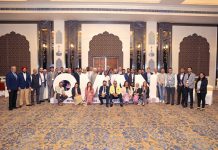Corporate travel, particularly in MICE, has evolved, shaped by global trends and specific needs. Corporate leaders share priorities, offering a comprehensive view of this dynamic field.
Janice Alyosius
The insights from industry leaders reveal the intricate planning and diverse considerations involved in corporate travel. From visa planning and catering to dietary needs to selecting visa-friendly destinations and ensuring safety, MICE sector requires a multifaceted approach. As India’s prominence in the global MICE industry grows, addressing safety concerns and leveraging government support will be key to its continued success.
First sort visa & diet
Talking about the key factors to investigates, while planning an incentive trip or a conference, Mridul Pahuja, Associate Vice President, Travel Mobility and Insurance, Motilal Oswal Financial Services, emphasised, “Early visa application is an advantage. Regarding visas, we normally plan well in advance. We like to work on visa at least three or four months ahead for international trips,” he said.
He also pointed out the need to cater to specific dietary needs. “As Indians, we have specific requirements such as Jain food and additional services, so we cater to these needs in advance,” he said. This attention to detail ensures a comfortable experience for all travellers.
Opting for visa-friendly destinations
Anjali Chugh, Chief Marketing Manager, Nuvama Group, underscored the importance of selecting visa-friendly international destinations to streamline the travel process for large groups. “When it comes to an international location, the area or country must be visa-friendly. I do not have to spend a lot of time getting visas for a group of 150 to 200 people. Other constraints regarding the convenience of getting direct flights and the attractions that the destination has to offer are crucial to keep the team motivated,” she explained.
For domestic travel, safety measures and travel convenience are paramount. “Travel convenience from the airport to various destinations is important. In India, it is easy to connect to many airports, but traveling from the airport to different cities or places frequently involves a lot of time on the road.”
India, the next big MICE industry
Gaurav Narula, Head, Supply Chain, Aakash Life, said India is making strides in the industry. “In the Indian MICE industry, we are doing a commendable job. The country’s investments and government support are noteworthy,” he asserted. Narula highlighted the rapid development of new hotels and destinations, such as Ayodhya, which are gaining global attention. “This increased visibility is intriguing. India is making headlines globally, positioning itself as a destination of the future. As we are working to becoming the world’s third-largest economy, our achievements in the MICE sector are notable” he said.
Despite the progress, Narula acknowledged challenges in safety and security, particularly for global travellers. “Despite potential, there remains apprehension among global, although this sentiment is not shared by Indian travellers. Addressing concerns regarding safety and security is paramount in instilling confidence among international visitors,” he emphasised.
Narula also witnessed potential in incentivising global corporations to host events in India, “Reflecting on my experiences with various countries and convention centres across the globe, it is evident that many nations actively promote tourism and incentivise corporate events. India is yet to capitalise on this opportunity. Incentivising global corporations to host events here could greatly enhance our standing in the global MICE market,” he said.
Corporate travel trends
Annabel Christine, AGM, Head of Travel, Ashok Leyland, observed a shift in corporate travel preferences, with organisations increasingly sourcing their own convention centres. “As an organisation, we prefer to source our own convention centres, occasionally seeking support from specific vendors. Direct involvement allows us to manage the process more efficiently. We prioritise venues such as hotels that can accommodate a larger bandwidth of attendees, facilitating a seamless experience within one property,” Christine said.
She stressed, “Convention centres remain a focal point due to their tailored offerings for corporate events. Thus, securing suitable space for our conventions is paramount.”
She also noted the resilience of travel demand post-COVID, with organisations recognising the value of in-person interactions. “Despite initial concerns during the pandemic, travel has rebounded significantly. Video-conferencing has not replaced the need for in-person interactions; rather, people are eager to reconnect and make up for lost time. Organisations recognise the value of investing in incentive programmes to foster employee engagement and dealer satisfaction,” Christine remarked. The support from tourism boards and the importance of building relationships with destination management companies (DMCs) are key aspects of her travel planning strategy.
One major trend that Narula highlighted is the increase spending capacity, “Post-COVID landscape has seen a notable shift. Despite initial hesitance, people are increasingly eager to travel and invest in experiences. Money is no longer a major concern for everyone. For instance, the hotel prices and airfares are skyrocketing, yet people continue to travel without much worry” Narula said.
Logistics remain vital
Amol Prasadi, Head, Supply Chain Management, Metro Brands Limited, outlined the critical factors in selecting suppliers for corporate events. Logistics, novelty, and accommodation capacity are paramount. “The first thing we consider is the distance. Can the chosen location or site handle a group of our size efficiently?” he questioned.
“We assess what new offerings the supplier has to offer. For instance, we opted for complete commando training, a departure from our usual leisure activities. This unique experience not only provided fun but also unveiled new trends among our team members,” Prasadi asserted.
Adequate medical support and suitable accommodations are also crucial. “We evaluate whether the location offers suitable accommodations and amenities. Is there a range of properties available? Can they cater to our needs, including food and medical facilities? Given the size of our groups, such considerations are crucial,” he underlined.
India is making headlines internationally, positioning itself as a destination of the future
Logistics, novelty, and accommodation capacity are paramount. There are other vital factors such as selecting suppliers for corporate events















